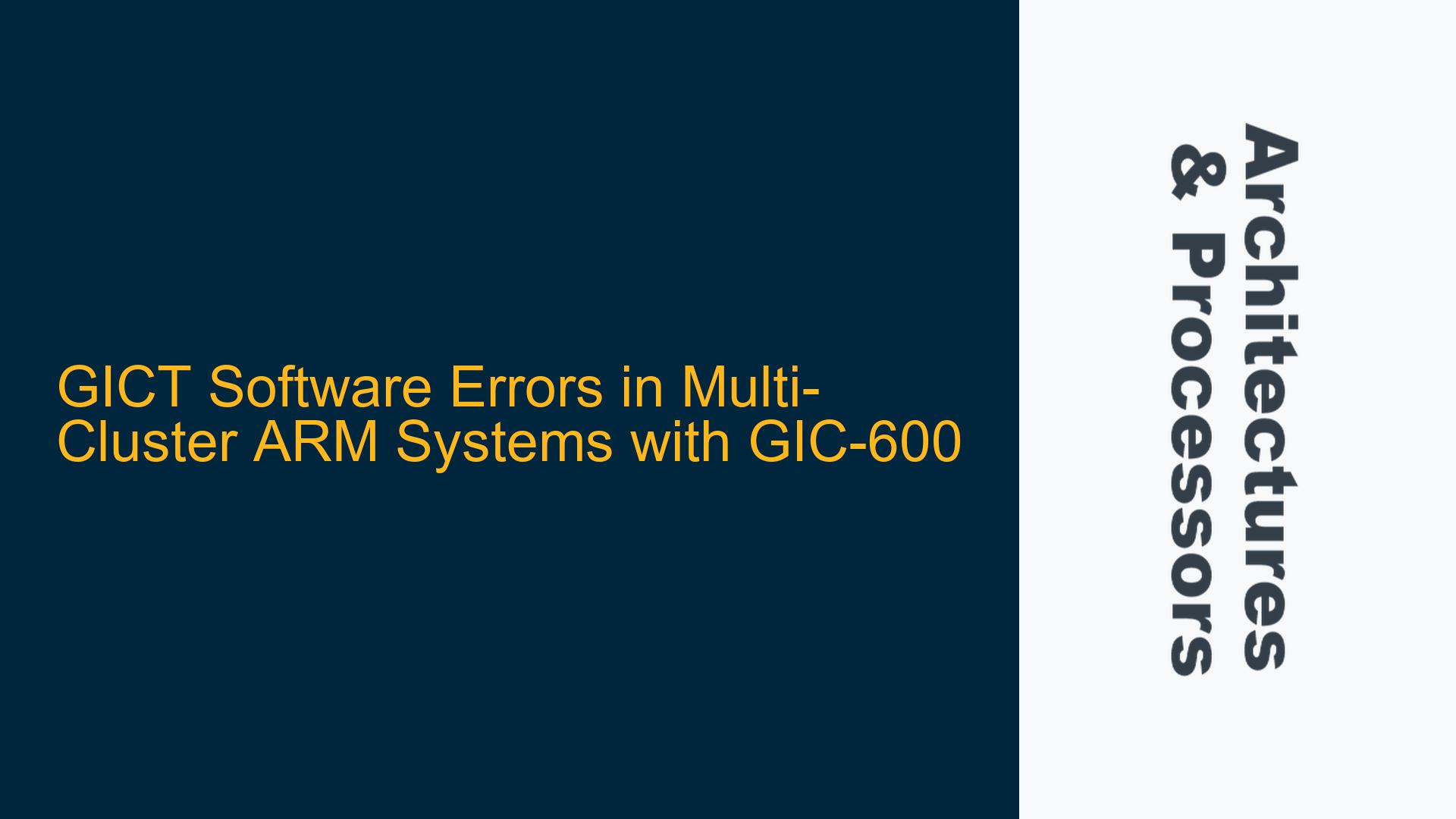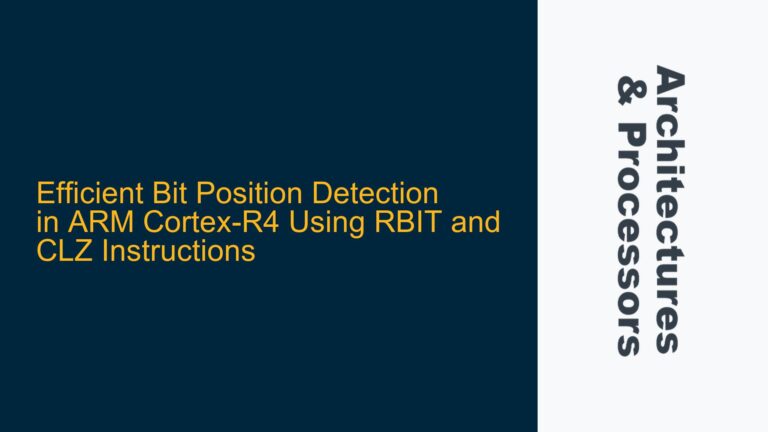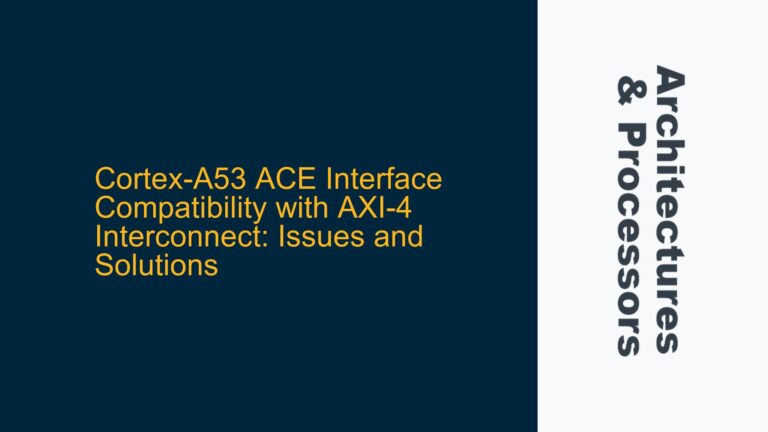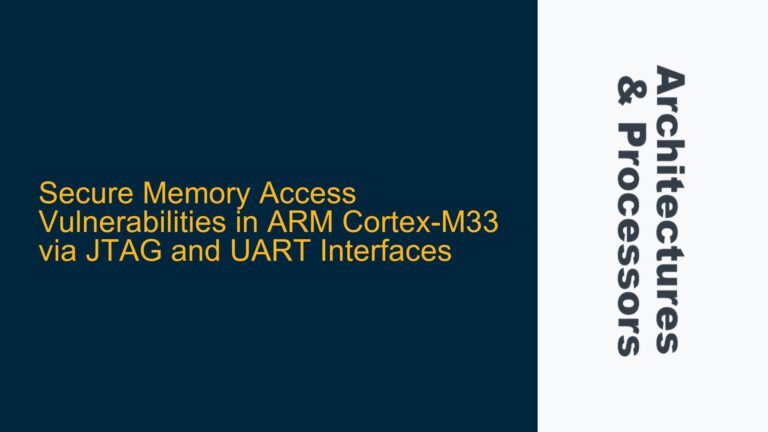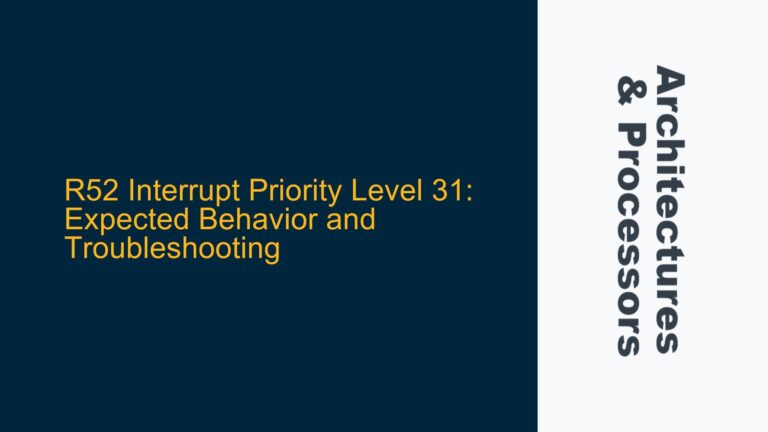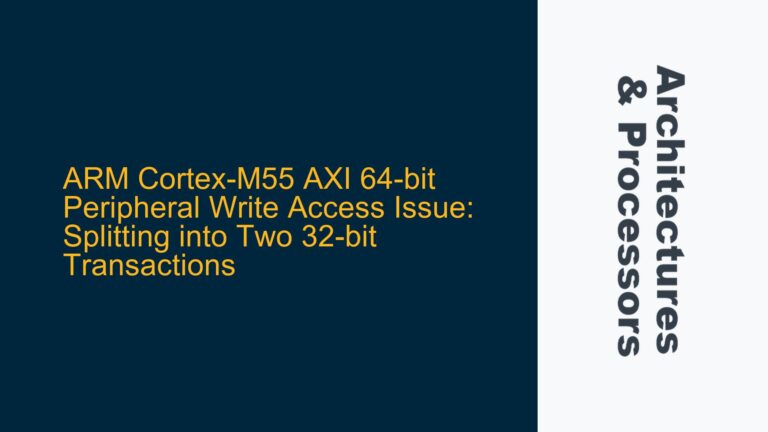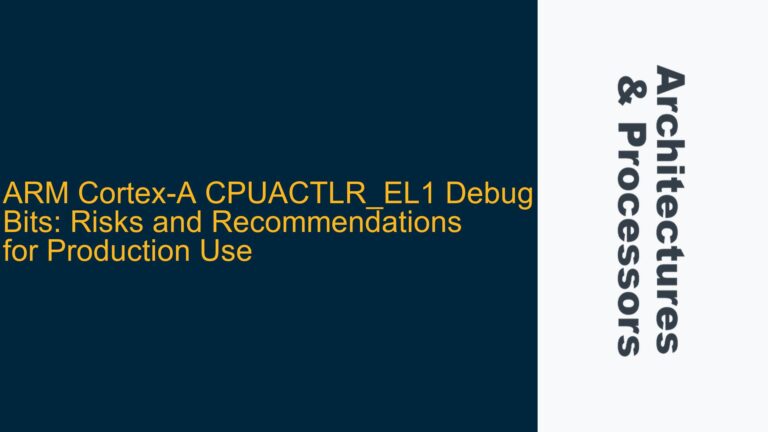GICT_ERRSTATUS.IERR and SYN_PPI_PWRDWN Errors During Redistributor Access
The issue at hand involves the Generic Interrupt Controller (GIC) in a multi-cluster ARM-based system, specifically the GIC-600 implementation. The system comprises two clusters: Cluster 0 with 8 cores and Cluster 1 with 2 cores. When accessing the redistributor registers of Cluster 1, the GIC Translation (GICT) module throws a software error, specifically GICT_ERRSTATUS.IERR: 0x1 with an additional error code SYN_PPI_PWRDWN. This error occurs when attempting to access the Waker register of cores in Cluster 1 while the redistributor and CPU link are offline. Notably, no such error occurs in Cluster 0, even under similar conditions.
The problem is further exacerbated during a scrub operation, where the system attempts to set GICR_FCTLR.sip = 0x1 in the register of Cluster 1. This operation also triggers the SYN_PPI_PWRDWN error. The core questions revolve around whether GICT behaves differently in cluster-based architectures, whether additional settings are required for GICT in such systems, and whether scrubbing operations are valid when the redistributor is in a powered-down state.
Understanding the behavior of GICT in multi-cluster systems is critical because the GIC-600 is designed to handle complex interrupt routing and power management across multiple clusters. The redistributor, a key component of the GIC, is responsible for distributing interrupts to specific cores. When the redistributor or its associated CPU link is offline, accessing its registers can lead to undefined behavior, especially if power management protocols are not strictly followed.
The GICT_ERRSTATUS.IERR error indicates an internal error within the GICT module, while SYN_PPI_PWRDWN suggests a synchronization issue related to power-down states of Peripheral Peripheral Interrupts (PPIs). These errors point to potential misconfigurations or timing issues in the power management and interrupt handling mechanisms of the system.
Cluster-Specific GICT Behavior and Power Management Misconfigurations
The root cause of the GICT_ERRSTATUS.IERR and SYN_PPI_PWRDWN errors lies in the interaction between the GICT module, the redistributor, and the power management states of the cores in Cluster 1. Several factors contribute to this issue:
-
Cluster-Specific GICT Behavior: The GIC-600 is designed to operate seamlessly across multiple clusters, but its behavior can vary depending on the cluster configuration and the state of the redistributor. In Cluster 1, the redistributor and CPU link being offline while accessing the Waker register triggers the error. This suggests that the GICT module in Cluster 1 may have stricter power management requirements or different timing constraints compared to Cluster 0.
-
Power Management State Mismatch: The
SYN_PPI_PWRDWNerror indicates that the system is attempting to access a redistributor register while the associated PPIs are in a power-down state. This is particularly problematic during scrub operations, where the system tries to setGICR_FCTLR.sip = 0x1. If the redistributor is not properly powered up or if the power-down sequence is not correctly synchronized, the GICT module will flag this as an error. -
Redistributor Offline State: When the redistributor is offline, its registers may not be accessible or may return undefined values. Attempting to access these registers without ensuring that the redistributor is in a valid state can lead to errors. The fact that Cluster 0 does not exhibit this behavior suggests that the offline state handling may differ between clusters.
-
Scrubbing Operation Timing: Scrubbing operations, which involve clearing or resetting certain registers, must be performed when the redistributor is in a valid state. If the redistributor is powered down or transitioning between states, scrubbing operations can lead to synchronization errors. The
SYN_PPI_PWRDWNerror during the scrub operation indicates that the system is not properly accounting for the power state of the redistributor. -
GICT Configuration Differences: There may be subtle differences in the GICT configuration between Cluster 0 and Cluster 1. For example, Cluster 1 may have different cache coherency settings, memory barriers, or interrupt routing configurations that affect how the GICT module handles errors. These differences can lead to inconsistent behavior between clusters.
Resolving GICT Errors Through Power State Synchronization and Configuration Adjustments
To address the GICT_ERRSTATUS.IERR and SYN_PPI_PWRDWN errors, the following troubleshooting steps and solutions can be implemented:
-
Ensure Proper Power State Synchronization: Before accessing the redistributor registers, ensure that the redistributor and CPU link are in a valid power state. This can be achieved by implementing proper power management protocols, such as:
- Checking the power state of the redistributor before accessing its registers.
- Ensuring that the redistributor is powered up before performing any operations.
- Adding synchronization barriers to ensure that the power state transitions are complete before proceeding.
-
Modify Scrubbing Operation Timing: Scrubbing operations should only be performed when the redistributor is in a valid state. To achieve this:
- Add checks to ensure that the redistributor is powered up before initiating a scrub operation.
- Implement a delay or polling mechanism to wait for the redistributor to reach a stable state before performing the scrub operation.
- Consider using a software-based state machine to manage the power state transitions and scrub operations.
-
Adjust GICT Configuration for Cluster 1: Review and adjust the GICT configuration for Cluster 1 to ensure consistency with Cluster 0. This may involve:
- Comparing the GICT configuration settings between Cluster 0 and Cluster 1.
- Ensuring that the cache coherency settings, memory barriers, and interrupt routing configurations are consistent across clusters.
- Applying any necessary configuration adjustments to Cluster 1 to align its behavior with Cluster 0.
-
Implement Error Handling and Recovery Mechanisms: To handle potential errors gracefully, implement error handling and recovery mechanisms, such as:
- Adding error detection and recovery routines to handle
GICT_ERRSTATUS.IERRandSYN_PPI_PWRDWNerrors. - Logging error details for further analysis and debugging.
- Implementing fallback mechanisms to retry operations or switch to alternative configurations in case of errors.
- Adding error detection and recovery routines to handle
-
Validate Power Management Sequences: Validate the power management sequences for Cluster 1 to ensure that they are correctly implemented. This can be done by:
- Reviewing the power management sequences in the system firmware.
- Using simulation or debugging tools to trace the power state transitions and identify any discrepancies.
- Updating the power management sequences to ensure that they are consistent with the GIC-600 specifications.
-
Consult ARM Documentation and Support: If the issue persists, consult the ARM documentation for the GIC-600 and GICT modules to ensure that all configuration and power management requirements are met. Additionally, consider raising an official support case with ARM for further assistance.
By following these steps, the GICT_ERRSTATUS.IERR and SYN_PPI_PWRDWN errors can be effectively resolved, ensuring reliable operation of the GIC-600 in multi-cluster ARM systems. Proper synchronization, configuration adjustments, and error handling mechanisms are key to addressing the underlying issues and achieving consistent behavior across all clusters.
